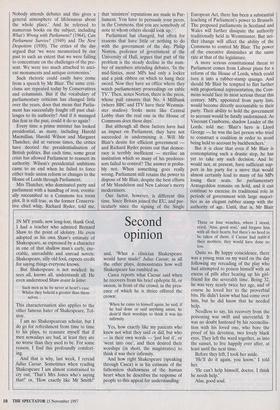Second opinion
IN MY youth, now long-lost, thank God, I had a teacher who admired Bernard Shaw to the point of idolatry. He even adopted as his own Shaw's estimate of Shakespeare, as expressed by a character in one of that shallow man's early, exe- crable, unreadable and unread novels: Shakespeare, silly old fool, expects credit for saying things everyone knows.
But Shakespeare is not mocked: he sees all, knows all, understands all. He even understood Shaw avant la lettre:
Such men as he be never at heart's ease Whiles they behold a greater than them- selves. ..
This characterisation also applies to the other famous hater of Shakespeare, Tol- stoy.
I am no Shakespearean scholar, but I do go for refreshment from time to time to his plays, to reassure myself that if men nowadays are bad, at least they are no worse than they used to be. For some reason, I find this profoundly comfort- ing.
And that is why, last week, I reread Julius Caesar. Sometimes when reading Shakespeare I am almost constrained to cry out, 'That's Mrs Jones who's saying that!' or, 'How exactly like Mr Smith!' and, 'What a clinician Shakespeare would have made!' Julius Caesar, as all the other plays, demonstrates how well Shakespeare has rumbled us.
Casca reports what Caesar said when he recovers from his brief epileptic fit, or swoon, in front of the crowd, in the pres- ence of which he is thrice offered the crown:
When he came to himself again, he said, if he had done or said anything amiss, he desir'd their worships to think it was his infirmity.
Yes, how exactly like my patients who knew not what they said or did, but who — in their own words — 'just lost it', or `went into one', and then desired their worships (in short, the magistrates) to think it was their infirmity.
And how right Shakespeare (speaking through Casca) is in his estimate of the fathomless shallowness of the human heart when he describes the response of people to this appeal for understanding:
Three or four wenches, where I stood, cried, 'Alas, good soul,' and forgave him with all their hearts; but there's no heed to be taken of them; if Caesar had stabb'd their mothers, they would have done no less.
Quite so. By happy coincidence, there was a young man on my ward on the day following my rereading of the play who had attempted to poison himself with an excess of pills after beating up his girl- friend for the severalth time. Being 32, he was very nearly twice her age, and of course he loved her to the proverbial bits. He didn't know what had come over him, but he did know that he needed help.
Needless to say, his recovery from the poisoning was swift and uneventful. It was no doubt hastened by his reconcilia- tion with his loved one, who bore the proof of his devotion, two lovely black eyes. They left the ward together, as into the sunset, to live happily ever after, at least until the next time.
Before they left, I took her aside.
`He'll do it again, you know,' I told her.
`He can't help himself, doctor. I think he needs help.'
Alas, good soul.










































































 Previous page
Previous page